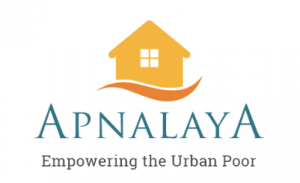
Enabling, empowering, ensuring.
India’s urban poor
With the increase in urbanisation in India, the intergenerational deprivation, vulnerability, exclusion, and insecurity of the urban poor is on the rise – and will worsen by 2030.- The urban poor are devoid of civic amenities, such as water, sanitation, electricity and open spaces.
- They lack access to healthcare, education and livelihood opportunities.
- They struggle to survive under the constant threat of insecure livelihoods.
The result? They are trapped in a vicious cycle of marginalisation.
Living in urban areas by 2030
0
m
Number of urban poor in India
0
m
Households in Indian slums
0
m
Of Mumbai's population lives in slums
0
%
Individuals
For the urban poor living in an overcrowded slum, the daily struggle for survival is tough. They often have no access to water, toilets, electricity, streetlights and paved lanes. Add limited access to healthcare, poor educational facilities and limited skills to pursue a livelihood, and each person becomes trapped in a vicious cycle of poverty.
Apnalaya helps individuals gain access to basic needs necessary for survival, including services (such as water, electricity, sanitation), healthcare, education and opportunities for livelihood.
Government
The apathy of the people with voice, visibility, and resources, combined with ineffective policies lead to an increasing voicelessness rendering the urban poor helpless. What compounds the problem even further is, often, the urban poor are disenfranchised on account of being migrants and undercounted in the Census and other official surveys.
Apnalaya advocates key issues of the urban poor to Government, providing consultation, collaborating with like-minded organisations, and creating awareness via the media, for improved provision of civic amenities and services.
Communities
The urban poor are often devoid of basic entitlements otherwise prescribed to citizens of India. Their capacity to influence systems is extremely restricted. They invariably have limited or no opportunity to make demands on the system, and often operate within frameworks which do not guarantee them their basic entitlements.
Apnalaya empowers the community to help themselves, by imparting Civic Education, building a cadre of Community Volunteers, and organising people into Civic Action Groups to engage with municipal authorities on issues of common concern.
People reached by Apnalya in 2019-2020.
0
Reduction in Under 5 mortality rate in 2019-20 vs previous year
0
%
Water connections installed
0
Women & youth empowered with a livelihood since 2014-15
0
About
Apnalaya was founded in 1972 by Tom Holland, the then Australian Consulate General in Mumbai, who set up a Daycare Centre for children of migrant labourers in the hutments of Nariman Point, Mumbai.
Current President, Geetanjali Jha Chakraborty has been involved with Apnalaya for several years. Geetanjali has held leadership and CEO level roles in Concern India Foundation, CHILDLINE India Foundation, and ARMMAN, and is currently on the board of Foundation for Mother and Child Health and a global advisor to Tech Care For All. She is passionate about child protection, urban inequality, and mental health.
